PLAnetary SUStainability 21: Challenges, Opportunities and Necessities
The workshop connected space & global sustainability, key space actors and sustainability thinkers and took place on Thursday 29/4/21 9-17 CET online.
>> You can now view the workshop sessions on youtube. Due to technical difficulties, the presentation by Andreas Losch was postponed to the beginning of the afternoon session.
Also, the PLASUS21 Workshop Report (PDF, 377KB) is now available.
Schedule
09:00-9:05 Opening: Natália Archinard (Federal Department of Foreign Affairs of Switzerland)
09:05-9:30 Planetary Sustainability: the concept (Andreas Losch with André Galli, University of Bern & Xiao-Shan Yap, EAWAG/University of Utrecht)
09:30-10:00 Planetary Boundaries and Limits to Growth (Christian Berg, Club of Rome)
10:00-10:25 Earth-Space Sustainability (Xiao-Shan Yap, EAWAG/University of Utrecht)
10:25-10:40 Break
10:40-11:25 Environmental challenges: Space Debris, Megaconstellations, and the Preservation of our Night Sky (Thomas Schildknecht, University of Bern)
11:25-11:45 Active Space Debris removal (Luc Piguet, ClearSpace SA)
11:45-12:05 Space Sustainability Rating (Nikolai Khlystov, World Economic Forum)
12:05-12:10 Words of welcome from our host (Mathias Wirth, University of Bern)
12:10-13:30 Lunch Break (with the option for 1:1 sessions)*
13:30-14:30 Challenges and Opportunities I
- Space can do more for Earth (Gaetan Petit, Space4Impact)
- Space Resources & Innovation (Dovilé Matuleviciute, Luxembourg Space Agency)
14:30-14:45 Break
14:45-16:15 Challenges and Opportunities II
- Forward to the Moon: Europe’s exploration program Terrae Novae and Artemis (Stefaan De Mey, European Space Agency)
- Sustainable Space Logistics (Emmanuelle David, EPFL)
- Biological Challenges in Space (Oliver Ullrich, University of Zurich)
16:15-16:30 Break
16:30-17:00 Planetary Sustainability: Moving Forward (Panel with Christian Berg, Stefaan de Mey, Nikolai Khlystov, Dovilé Matuleviciute and Thomas Schildknecht, moderated by Xiao-Shan Yap and Andreas Losch )
17:00-18:00 Free (Option for 1:1 sessions*)
*The platform we use offers the option to schedule 1:1 meetings with other registered participants on the platform. You are welcome to use this function.
The talk “Sustainable Embeddedness of Space Activities” by Traugott Jähnichen unfortunately had to be canceled. His views you can read here.
For financing the workshop, its evaluation and related research, further sponsors and donations are much welcome.
Think big. Think connected. Think planetary. Act Sustainably.
Workshop Sponsors and Media Partner



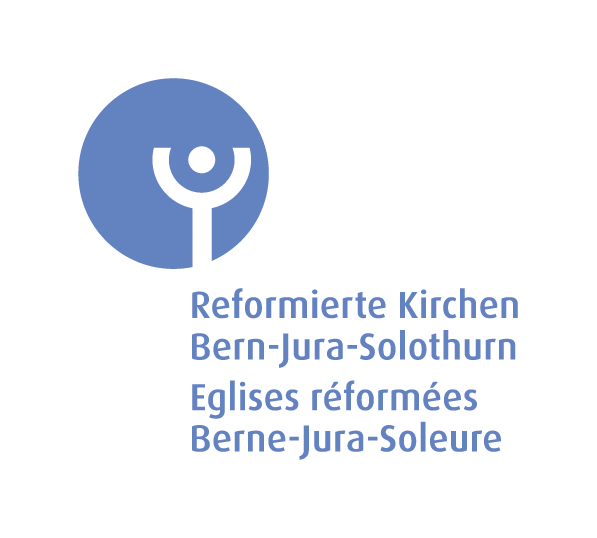
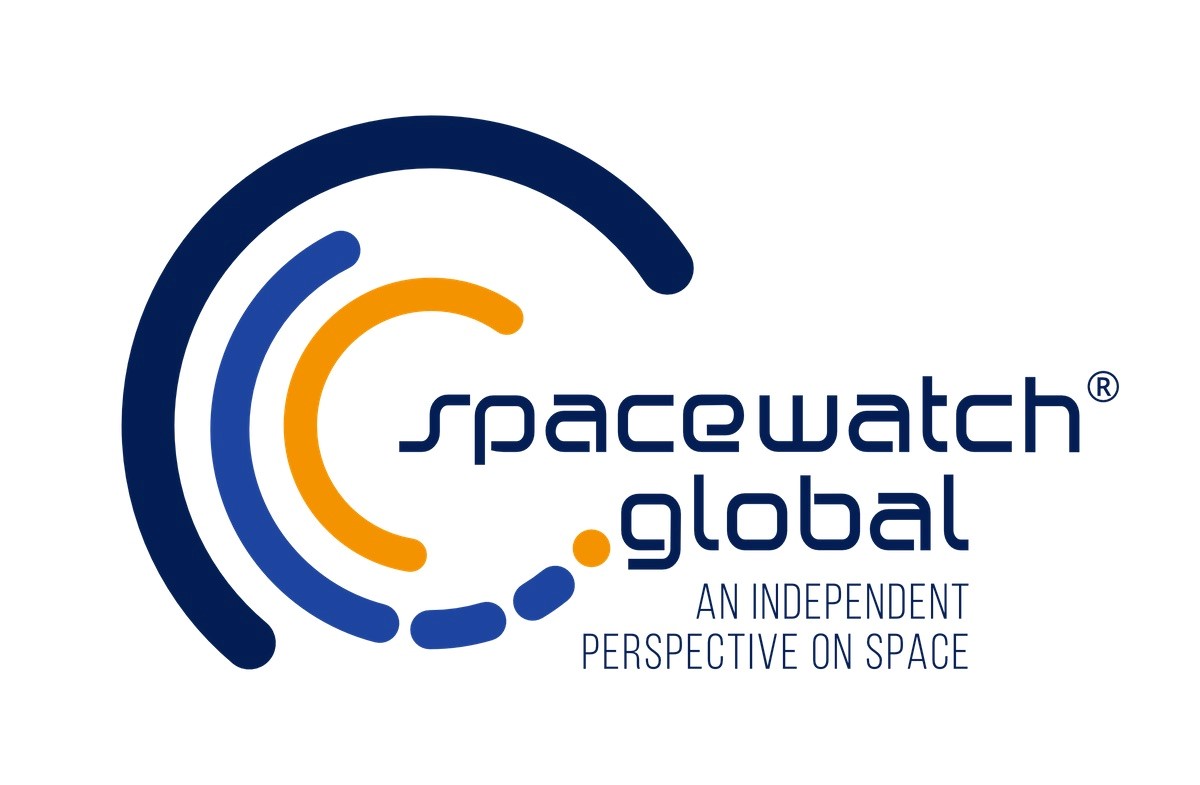
Speakers
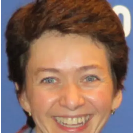
Dr. Natália Archinard
holds the space portfolio at the Federal Department of Foreign Affairs of Switzerland. She has been leading the Swiss delegation to the United Nations Committee on the Peaceful Uses of Outer Space (COPUOS) for more than a decade and serves as the Chair of the Scientific and Technical Subcommittee of COPUOS for the period 2020-2021. Ms Archinard has been representing the Swiss government in multilateral negotiations on space security and sustainability-related initiatives, including the development of the Guidelines on the Long-term Sustainability of Outer Space Activities within COPUOS and the draft International Code of Conduct proposed by the European Union in 2012-2015. She is member of the Swiss delegations to the European Space Agency (ESA), including at ministerial level, and to the United Nations General Assembly 1st and 4th Committees. At national level, she is involved in the design and the implementation of the Swiss space policy. Dr Archinard was educated in mathematics at the University of Geneva and obtained her PhD from the Swiss Federal Institute of Technology (ETH) Zurich in 2000.
Dr. Archinard will provide the Opening Remarks.
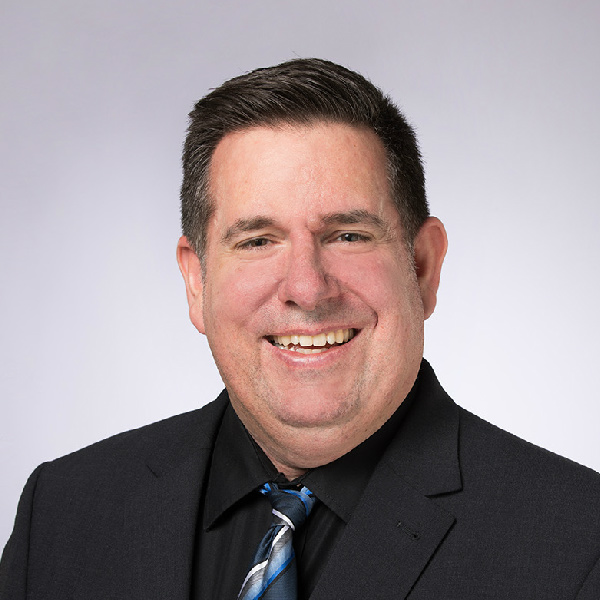
Dr. Andreas Losch, MBA
is an award-winning theologian, specializing in the dialog with the sciences and with philosophy. He was managing editor of the Martin Buber edition, coordinated the project “Life beyond our planet?” at the Center for Space and Habitability (CSH) Bern and works as researcher affiliated with the Theological Faculty of the University of Bern on „Ethics of Planetary Sustainability“. As such he was active participant of the UNISPACE+50 preparatory event. Losch is a member of the Center of Theological Inquiry (CTI), Princeton, New Jersey, and he serves on the council of the European Society for the Study of Science and Theology (ESSSAT) and on the board of trustees of the Karl Heim Society. He is also editor-in-chief of the theology & science website www.theonat.info.
Planetary Sustainability: the concept
Humans are setting out for the stars. Our space environment is being used more and more intensively, mega constellations are beginning to light up the night sky and disrupt science. Junk is accumulating in the more heavily used Earth orbits. It’s not just the U.S. that wants to go back to the Moon, and this time plans to use its resources.
As time on Earth is limited, we need to move. But we need ethical guidelines in the area of outer space, which is an international domain, especially because the law remains open to interpretation. Moreover, we need to link the issues of sustainable space use with the environmental debate here on Earth: we should discuss an 18th Sustainable Development Goal for our space environment.
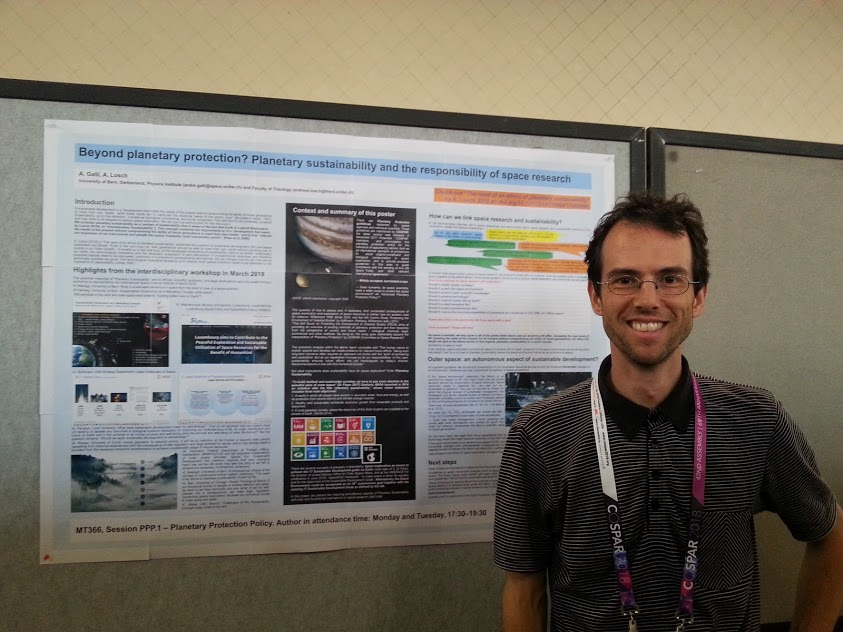
PD Dr. André Galli
received a Ph.D. in Physics from the University of Bern in 2008. After a period as an engineer and technology consultant and his post-doctoral period at the Netherlands Institute for Space Research, he rejoined in 2012 the University of Bern as a scientist. His research topics cover a broad range from laboratory experiments in the context of icy surfaces in the solar system, data analysis for space missions (Mars Express, Venus Express, IBEX, Rosetta), to project science and management for upcoming space missions (JUICE and IMAP in particular).
COSPAR Insights
The contribution will be about Planetary Sustainability from the perspective of space science and summarize activities by the Committee on Space Research (COSPAR) to establish a framework for environmental stewardship on celestial bodies.
Prof. Dr. Christian Berg
has extensive professional experience as sustainability lecturer and keynote speaker for (corporate) sustainability. Among others, he worked as Chief Sustainability Architect at SAP and led the task for Sustainable economic activity and growth within German Chancellor Merkel’s future dialogue. His book “Sustainable Action. Overcoming the Barriers” was accepted as the new report to the Club of Rome. Therein he gives a comprehensive account of barriers to sustainability and suggests action principles for sustainability which support actors in contributing to the realization of the SDGs. He holds degrees in physics, philosophy, theology and engineering. For more information, please see www.christianberg.net or visit his profile on LinkedIn.
Planetary Boundaries and Limits to Growth
The famous Apollo 11 image of the earth rising over the moons horizon in 1969 coined the metaphor of the spaceship earth which has become so influential in the environmental movement ever since. Humanity lives on a finite planet with limited natural resources and limited ecosystem capacity to cope with the remnants of our industrial metabolism. Despite all progress in space flights, fascinating news from astrophysics and astrobiology, and despite speculation about interstellar space flights there is no doubt that humankind will depend on their homeland planet for any foreseeable future.
The talk will first sketch the concepts of “limits to growth” (Club of Rome, 1972) and “planetary boundaries” (Rockström, Steffen et al. 2009) and then reflect on the question how space science and astrophysics can facilitate an understanding of the distinct peculiarities of humanities’ precious and fragile habitat.
Dr. Xiao-Shan Yap
is a research scientist at the Environmental Social Sciences department at Eawag in Switzerland and a guest Assistant Professor at Copernicus Institute of Sustainable Development, Utrecht University. Although trained as a Development Economist, Xiao-Shan has worked across different social sciences disciplines with her primary focus on development and sustainability issues. In the past, she has run empirical fieldwork on sectors ranging from semiconductors and integrated circuits to solar photovoltaic energy integration, as well as water recycling and sanitation, across different countries including Taiwan, China, India and South Africa. In 2020, she founded the Earth-Space Sustainability research initiative, with the aim of using evidence-based social science research to inform forward-looking policy scenarios concerning Space governance.
Earth-Space Sustainability: Challenges in active space debris removal through a discourse network analysis
The growing challenge of space debris has gained increasing attention in recent years in public media. In particular, active debris removal (ADR) has been covered following reported incidents of anti-satellite tests and the recent development of satellite megaconstellations. Over the years, ADR struggled with gaining legitimacy among diverse actors before stabilizing into an increasingly accepted norm. Drawing from institutional theory, we trace the ways ADR will increasingly be seen as valid solutions across different actors.
The talk will elaborate an in-depth discourse network analysis drawing on articles about ADR published in 300 English newspaper sources between 2007-2020. A systematic coding scheme was developed to map how different actors in the field have associated with the concept of ADR over the years. From these codes, we derived relational data, which enable the construction of actor networks, indicating the central actors for legitimizing or opposing active space debris management.
Our analysis shows that, although the concept of ADR has gained sufficient legitimacy in recent years, some critical issues remain as challenges and deserve urgent attention. These include the ambiguity of leaderships, the lack of international coordination and data sharing, as well as issues on trust and transparency. The constructed actor networks enable to identify collaboration potentials for accelerating the success of future space debris management.
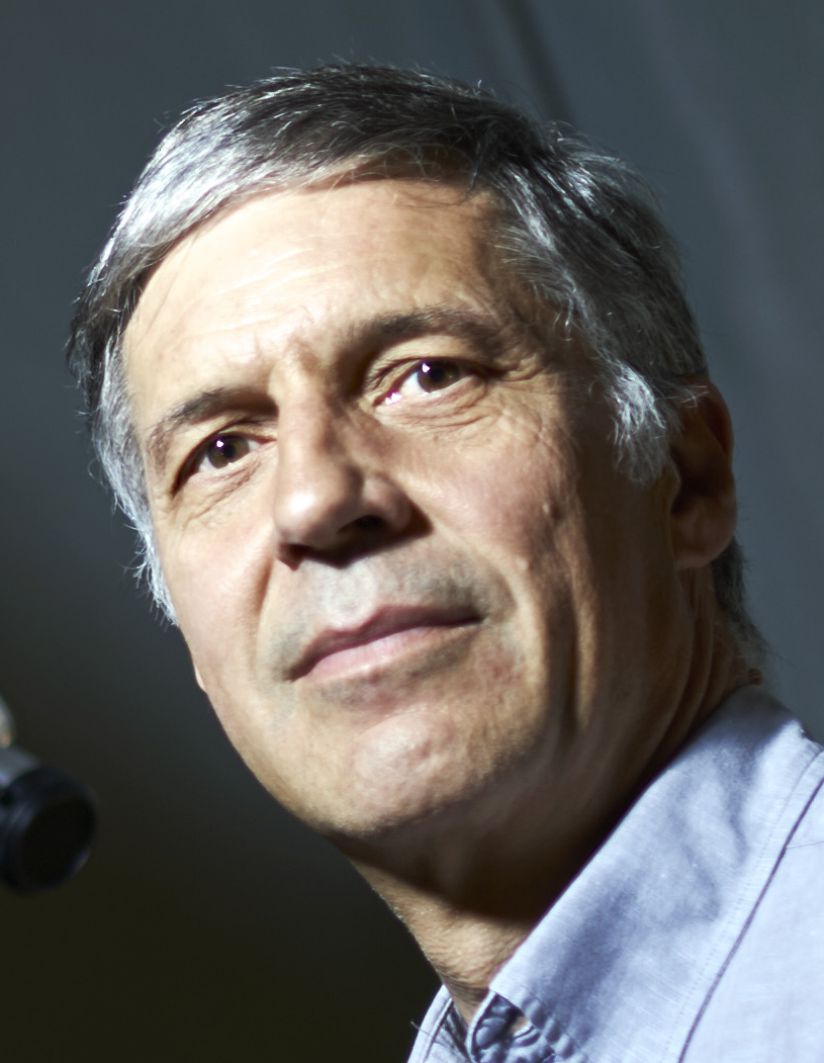
Prof. Dr. Thomas Schildknecht
is a leading expert on space debris, space safety and space sustainability. Under his leadership for more than 25 years, his research group has acquired a World-class expertise in the observation and the characterization of space debris. He is the Director of the Swiss Optical Ground Station and Geodynamics Observatory Zimmerwald and the Vice-Director of the Astronomical Institute of the University of Berne (AIUB), Switzerland. At both, national and global level, he has served and continues to serve in numerous technical and policy-making committees. He is a member of the Swiss delegation at UNCOPUOS and substantially contributed to the work of its working group on long-term sustainability of outer space activities. At ESA he is currently the Chair of the ESA Space Safety Advisory Group advising the ESA Director responsible for the space safety programme.
Environmental challenges: Space Debris, Megaconstellations, and the Preservation of our Night Sky
The proliferation of space debris and the increased probability of collisions and interference raise concerns about the long-term sustainability of space activities, particularly in the low-Earth orbit and geostationary orbit environments. During recent years the number of satellites launched to space increased by orders of magnitude in particular due to costs reductions enabled by miniaturization and rideshare launch opportunities, as well as due to the deployment of so-called megaconstellations by private actors. In order to allow for safe operations in near-Earth space, and to ensure sustainable use of this unique resource, numerous measures are urgently needed. These include inter alia the prevention of collision, the obligation to remove all objects after the end of their mission from the environment, active removal of existing debris, and international efforts to coordinate the traffic and manage the debris environment. Constellations of tens of thousands of satellites are also a concern to astronomers as many hundreds of bright moving dots will pollute the night sky at any time and at any place on Earth – even for naked eye observers the pristine night sky may be gone forever.
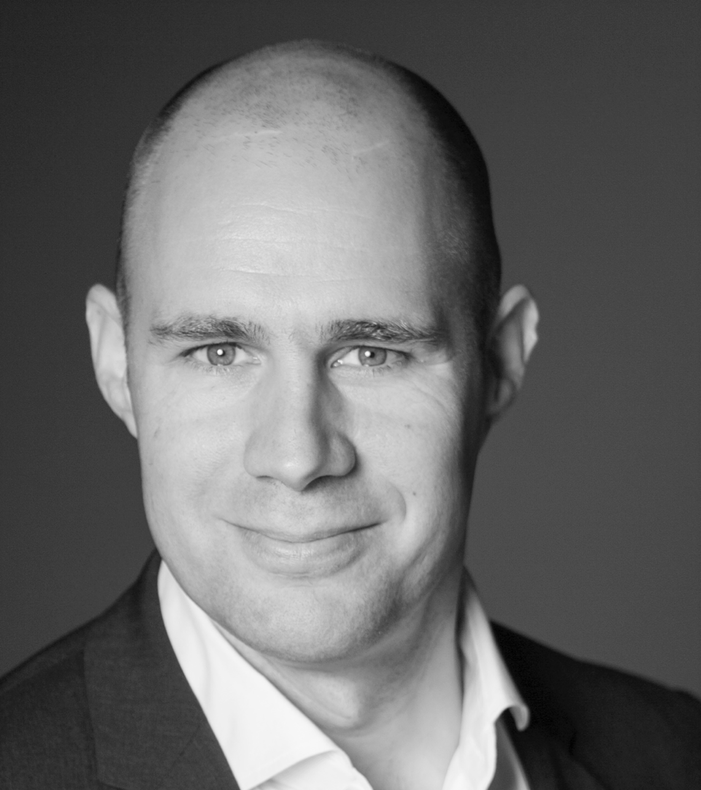
Luc Piguet
is the CEO and co-Founder of ClearSpace, a ground-breaking initiative based in Lausanne to clear up Space debris. In November 2020 ClearSpace SA signed a service contract with the European Space Agency (ESA) worth 86.2 million euros to remove orbital debris. This mission, named ClearSpace-1, will see the first debris removed by 2025. Luc studied at EPFL, with a degree in Electrical Engineering and an Executive Program at Stanford GSB.
Active Space Debris removal
ClearSpace is the result of a long-term project that began in 2012 at the EPFL Space Center (eSpace). Already, the aim of the initial CleanSpace-1 initiative was to develop technologies to capture and deorbit obsolete space objects – such as out-of-use satellites, rocket stages, parts of solar panels, and loose nuts and bolts – that had been put into orbit over the past 60 years and that are now filling up the space immediately above the Earth. These objects orbit our planet at a speed of 28,000 kmph, making them dangerous projectiles for working satellites and astronauts at the international space station. That’s why, in addition to deorbiting future satellites at the end of their useful life, space agencies need to find ways to get rid of the space satellites and debris already up there. Eight countries are involved in the ClearSpace project: Switzerland, the UK, the Czech Republic, Germany, Poland, Portugal, Romania and Sweden.
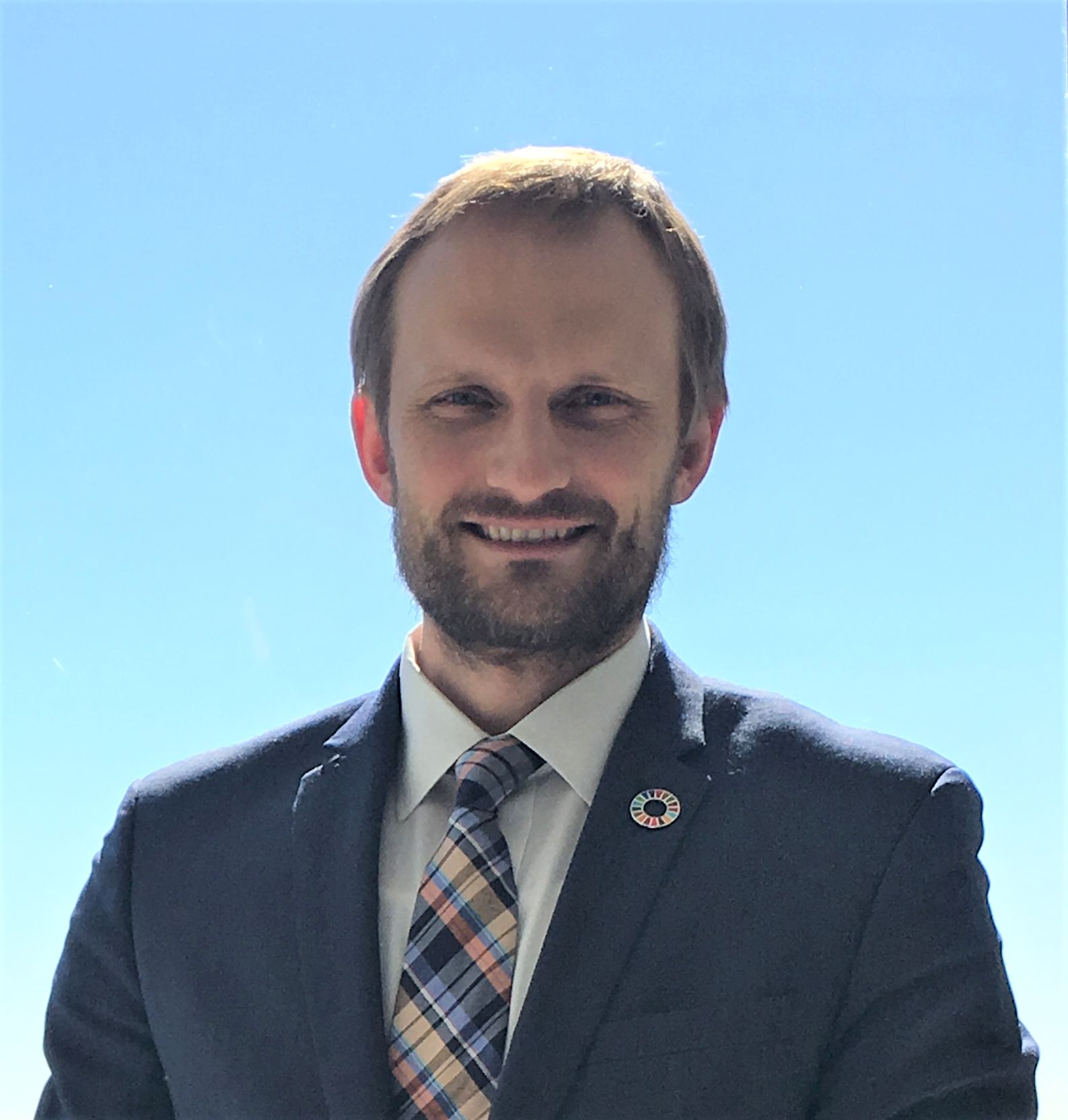
Nikolai Khlystov
is the Lead for Future of Mobility Platform and Space at the World Economic Forum, in Geneva. Nikolai leads the various efforts on space like the Global Future Council on Space and the Space Sustainability Rating. He has supported the Socio-Economic Panel of the Hague International Space Resources Governance Working Group and has appeared on a number of space related panels. Nikolai is a Russian Canadian and first became interested in space in his last year of university’s bachelor degree.
Space Sustainability Rating
As the long-term sustainability of the orbital environment comes more into question, diverse efforts are needed to support sustainable sector growth. A growing amount of space junk is accumulating in various orbits while the number of active satellites and actors that can launch their own missions, is rapidly increasing. Based on industry-identified best practices, international norms and objective analysis, the SSR will provide a structure for a voluntary, bottom-up third-party published rating measuring the degree to which operators adopt procedural, behavioral and systematic approaches to orbital missions, incentivizing more responsible behavior. While the SSR is meant to address the immediate need of reducing new debris creation in orbits today, in the long-run, it could expand to cover other aspect of sustainability in space and be used to incentive behavior when it comes to exploration, resource extraction, habitat building and so on. SSR is a multi-national and multi-stakeholder collaboration that includes the European Space Agency, Space Enabled Research Group of MIT’s Media lab, University of Texas at Austin, Bryce Tech and the World Economic Forum. The future host and issuing organization is expected to be announced in the coming weeks.
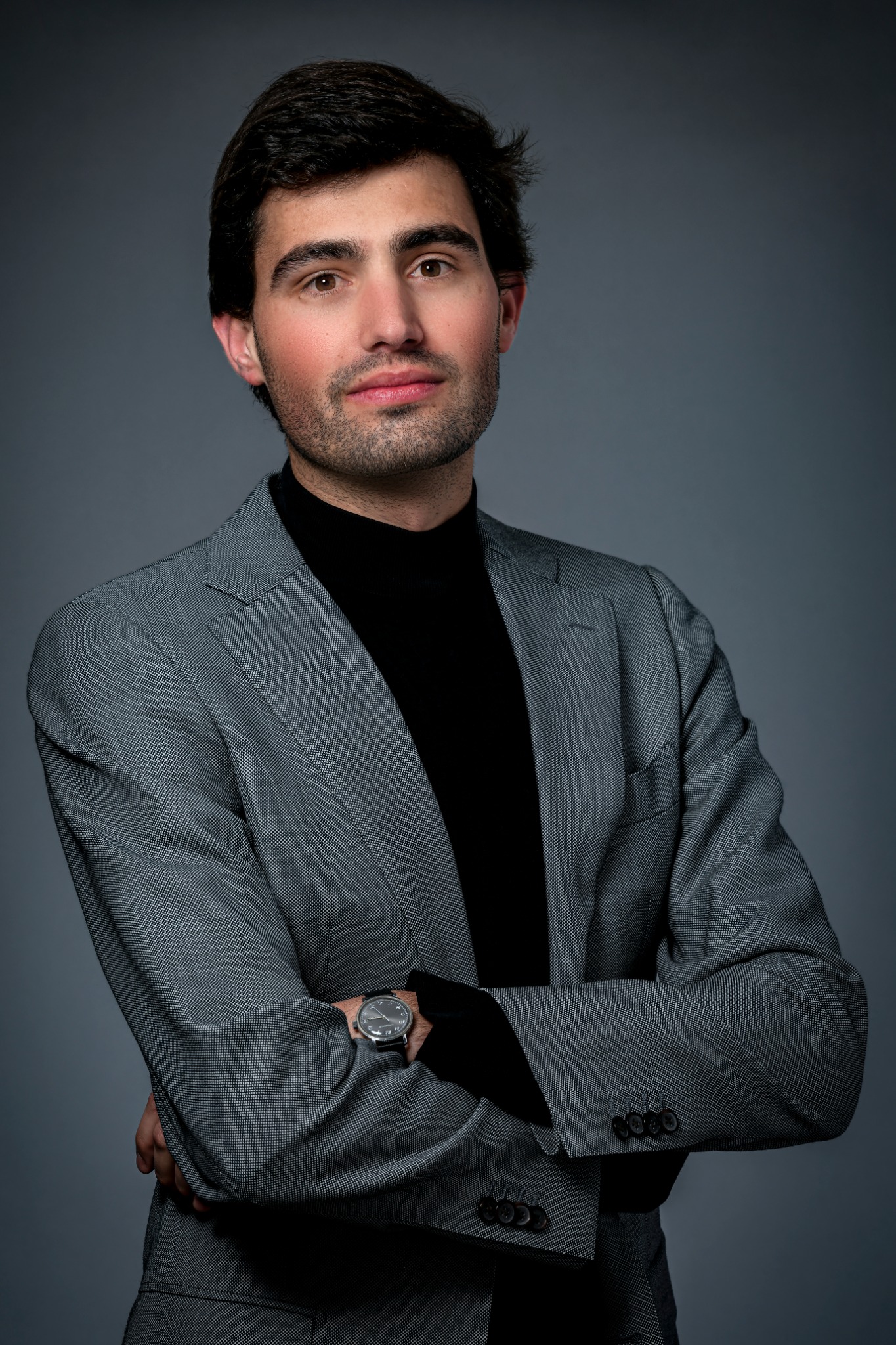
Dr. Gaetan Petit
is the co-founder of Space4Impact, an initiative that aims at fostering the economic growth of space activities in line with the UN SDGs for a sustainable future. Gaetan worked as a technology transfer officer at the Swiss Space Center and as a scientist at the European Space Agency’s Advanced Concepts Team. Gaetan holds an engineering degree from EPFL Lausanne and a PhD in Neuroscience from ETH Zurich.
Space can do more for Earth
The NewSpace sector is a fast-growing market, boosting the historical institutional Space exploration programs into commercial applications. Bryce Space & Technology and Morgan Stanley estimates that the roughly $366 billion global Space industry in 2019 could surge to over $1 trillion by 2040. The current growth in the development of Space infrastructures and production of data from Space is opening a full range of new applications with even more new business opportunities. This trend is difficult to follow for non-Space companies and investors, due to the lack of education/knowledge transfer, as well as the difficulties for NewSpace companies to reach the right customer for their products. Seizing the moment, Space4Impact wants to maximize the positive impact of Space technologies on Earth by linking New Space companies to non-space markets. To achieve this mission, Space4Impact is creating a digital ecosystem platform of governmental and non-governmental organisations, investors, corporates, and New Space entrepreneurs. The Space4Impact digital ecosystem platform helps corporates, investors and organisations, who want to integrate disruptive solutions, innovate and accelerate their impact sustainably by conducting open innovation challenges and initiating pilot projects with startups and News Space companies.
Ms. Dovilé Matuleviciute
currently holds the position of policy officer responsible for legal affairs at the Luxembourg Space Agency (LSA). At the LSA, her fields of expertise are international affairs and relations as well as legal and regulatory issues. Ms. Matuleviciute is a delegate of Luxembourg to the International Relations Committee of ESA, the United Nations COPUOS Scientific & Technical Subcommittee and Legal Subcommittee. Before joining the Ministry of the Economy and the Luxembourg Space Agency in 2016, Ms. Matuleviciute worked at a private space company where she was managing legal and contractual matters. She gained her first experience in various fields, such as business law, markets regulation & competition law, intellectual property law, international public law and European Union law, at multiple internationally recognized law firms based in Vilnius, Berlin, Paris and Brussels.
Space Resources & Innovation
In 2016, Luxembourg launched the SpaceResources.lu initiative with the aim to contribute to the peaceful exploration and sustainable utilization of space resources for the benefit of humankind. Luxembourg deployed significant resources and efforts to advance the topic at both the national and international level. The European Space Agency (ESA), the International Space Exploration Coordination Group and certain national space agencies recognize the strategic importance of space resources for future space exploration missions as well as their potential for scientific and economic activities in space. The SpaceResources.lu initiative addresses different challenges in a structured way through five strategic pillars: political support, legal framework, research & education, innovation, as well as funding instruments. Through the strategic pillar focusing on innovation, Luxembourg aims to provide dedicated support for industrial R&D activities related to the exploration and utilization of space resources. Currently, Luxembourg actively supports private companies in various projects through its national space R&D program, ESA and EU programs, as well as through provision of various competitions and prizes. Moreover, partnerships with the University of Luxembourg, the Luxembourg Institute of Science of Technology (LIST) or foreign research institutions are strongly encouraged.
In the frame of SpaceResources.lu initiative, LSA, ESA and LIST took another major step forward by creating the European Space Resources Innovation Centre (ESRIC) in 2020. ESRIC’s goal is to become the internationally recognized centre of expertise for scientific, technical, business and economic aspects related to the use of space resources for human and robotic exploration, as well as for a future in-space economy. In order to reach this goal, ESRIC’s activities in research, business, knowledge and community management are developed in close cooperation with public and private partners. Contributing to further innovation through different instruments on a national, European and international level offers great opportunities for synergies and sustainable development of future space resources activities.
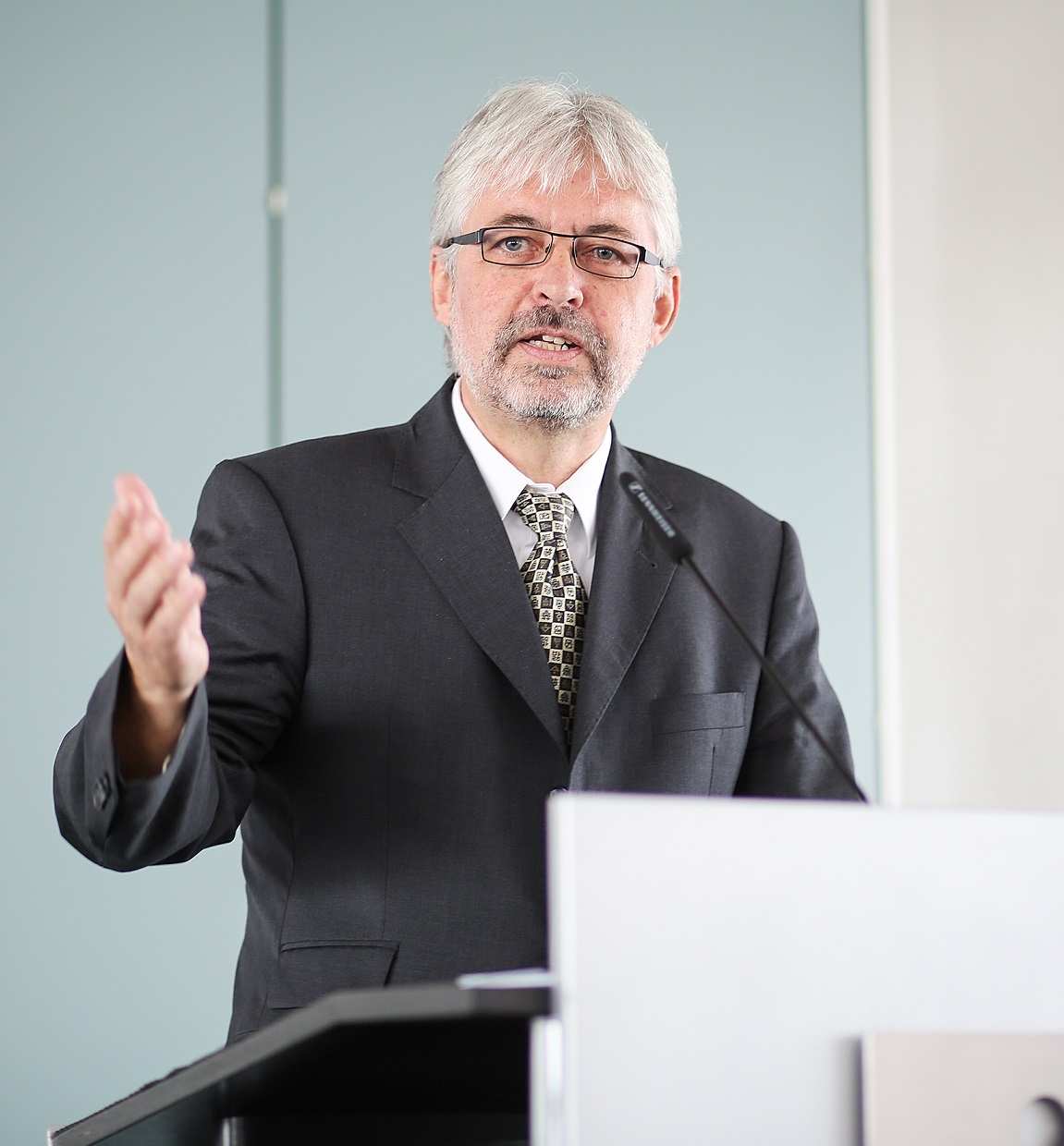
Prof. Dr. Traugott Jähnichen
holds the Chair of Protestant Social Ethics at the Faculty of Protestant Theology of the Ruhr-University Bochum. He is a theologian who also holds a diploma in economics. Traugott is Member of the Board of the Protestant Church of Westphalia, Member of the “Social Board” of the Protestant Church in Germany (EKD) and Responsable Editor of the “Zeitschrift für Evangelische Ethik”, among other publications . Research Areas include Social Ethics, spec. Economic Ethics, Religion and Society and Church History.
Sustainable Embeddedness of Space Activities
Due to the increasing economical exploitation of outer space, humanity faces a new challenge which – having economic advantages as well – also entails a great many ecological hazards. At present, humankind is encroaching on outer space, particularly in the form of thousands of active satellites and the corresponding space debris they produce. Further uses of outer space, such as tourism, so-called satellite mega-constellations, regular transport flights to the moon or even Mars and the extraction of water and valuable rocks from celestial bodies, are envisioned. There is the great danger that ecological damage like that caused in earlier phases of economic development will become externalized and ultimately pose a threat to the whole of humanity. The “global ‘sustainability trilemma’” remains unresolved. It consists in the fact that, in political resolutions, “the growth of resource-intensive prosperity is weighted far more highly than the conservation of functioning ecosystems and the implementation of inter- und intragenerational ‘justice’” (Sautter 2017) for this problem. In this situation, it is therefore even more important that rules for the sustainable use of outer space are established.
The talk unfortunately had to be canceled. Prof. Jähnichen's views you can read here.

Dr. Stefaan De Mey
is a senior strategy officer in the Directorate of Human Spaceflight and Robotic Exploration Programmes of the European Space Agency (ESA) where he coordinates the strategy area for human and robotic exploration. In this role he is also representing the Directorate in relevant European and international strategic networks, such as e.g. the International Space Exploration Coordination Group. From 2011 to 2016 he has been Secretary General of Eurisy, an international association of Space Agencies, with a mission to bridge space and society by promoting uptake of satellite data and services, and policy and operational research. In this function he has also been acting as Eurisy’s GEO principal alternate and Eurisy delegate to the UN Committee for the Peaceful Use of Outer Space. Prior to this position at Eurisy, Dr. De Mey has acquired extensive experience in Exploration programmes, providing the integration management function for ESA payloads/experiments selected for the International Space Station (ISS), and system engineering functions e.g. for biomedical research in microgravity, the EXPERT re-entry vehicle and launcher services, and the ASIM Earth Observation system for high altitude lightning. He started his career as a researcher in the field of cardiovascular fluid dynamics and the non-invasive diagnosis of heart failure using ultrasound. Dr. De Mey holds a PhD from Ghent University, a Master degree in Civil Engineering, and a Bachelor degree in Law.
Forward to the Moon: Europe’s exploration program Terrae Novae and Artemis
Terrae Novae, the European Exploration Envelope Programme, integrates ESA’s space exploration efforts in Low Earth Orbit, the Moon and Mars into a single programme. Its goal is to lead Europe’s human journey into the Solar System using a partnership with robotic missions as precursors and scouts. The second Period of ESA’s Terrae Novae Programme (2012-2022) was approved and fully funded at the ESA Council at Ministerial level in 2019 (Space19+). The newly approved missions are initiating history-making projects that will determine Europe’s role in global space exploration for the next decade and beyond. International cooperation in Terrae Novae is not an end in itself but an enabler for Europe to undertake large and complex space exploration missions that would otherwise be impossible. Through ESA, Europe is a reliable and trustworthy partner. With the European Service Module powering the Orion Spacecraft and European industry providing about half of the Lunar Gateway infrastructure, Europe is fully integrated into the Artemis programme, for the first time on the critical path of the international exploration efforts. With the development of these new missions in full swing, the next steps forward to the lunar surface and beyond are being prepared.
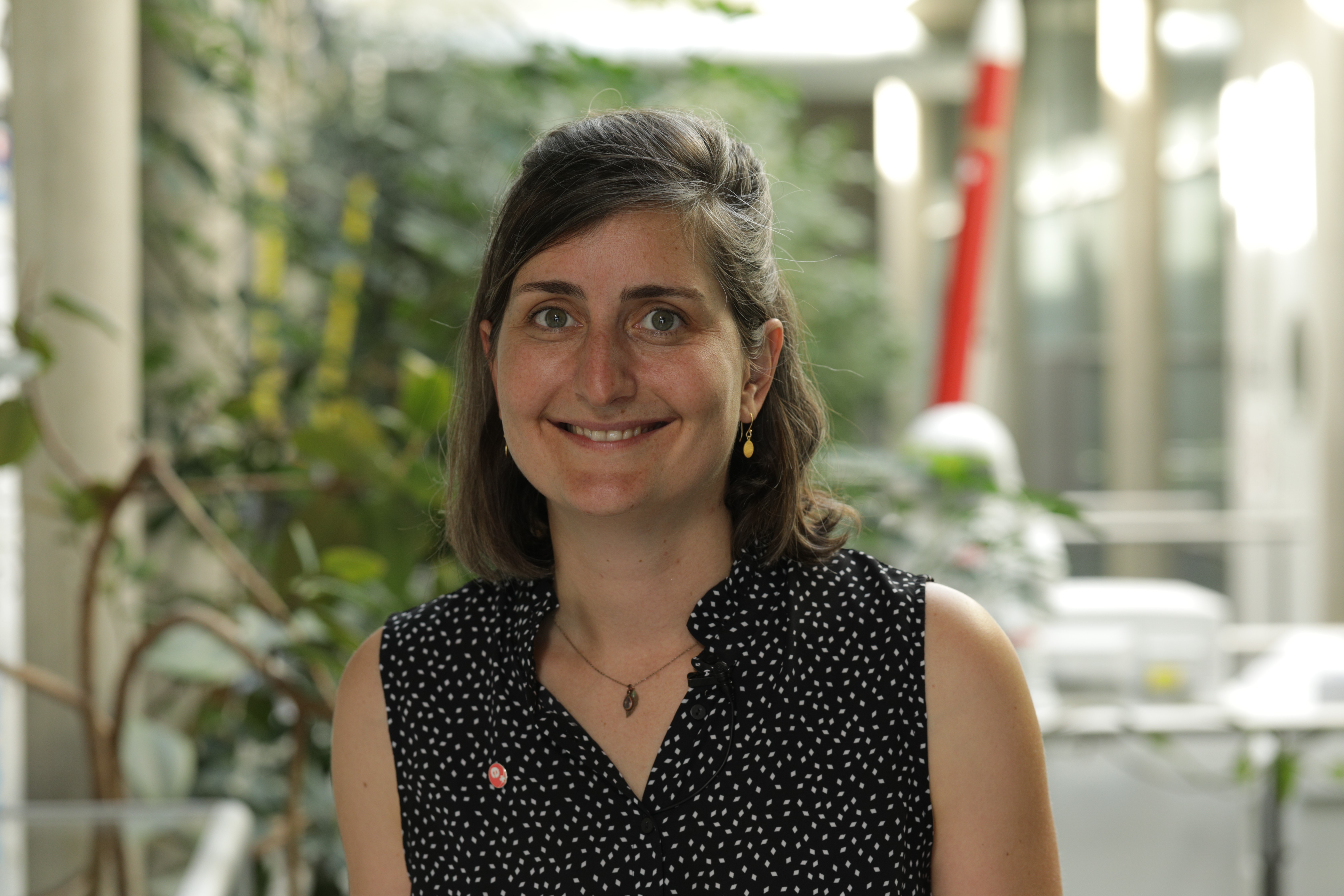
Ms. Emmanuelle David
is the executive manager of the EPFL Space Center. The EPFL Space Center (eSpace) is an interdisciplinary unit responsible for the federation of space activities at the school and co-lead a research initiative on sustainable space logistics. Emmanuelle has 10 years’ experience in space transportation in academia, agency and industry from pre-development projects up to launch operations. She holds Space Engineering degrees both from the University of Technology of Compiegne, France, and the Technical University of Braunschweig, Germany.
Sustainable Space Logistics
50 years of government-led space activities are now being reinvented by all stakeholders. And it should be done with United Nations and European Space Agency sustainability goals in mind. Introducing the Sustainable Space Logistics (SSL) initiative: in 2019, the EPFL Space Center (eSpace) in Lausanne, Switzerland, started a research initiative on Sustainable Space Logistics. The thematic of space logistics is still largely untouched and will be the backbone of multiple large-scale applications on new materials & services, data, human spaceflight, etc. The talk will present the initiative, the main research streams and also the outcome of the first Sustainable Space Logistics Digital Symposium that was held in February 2021.
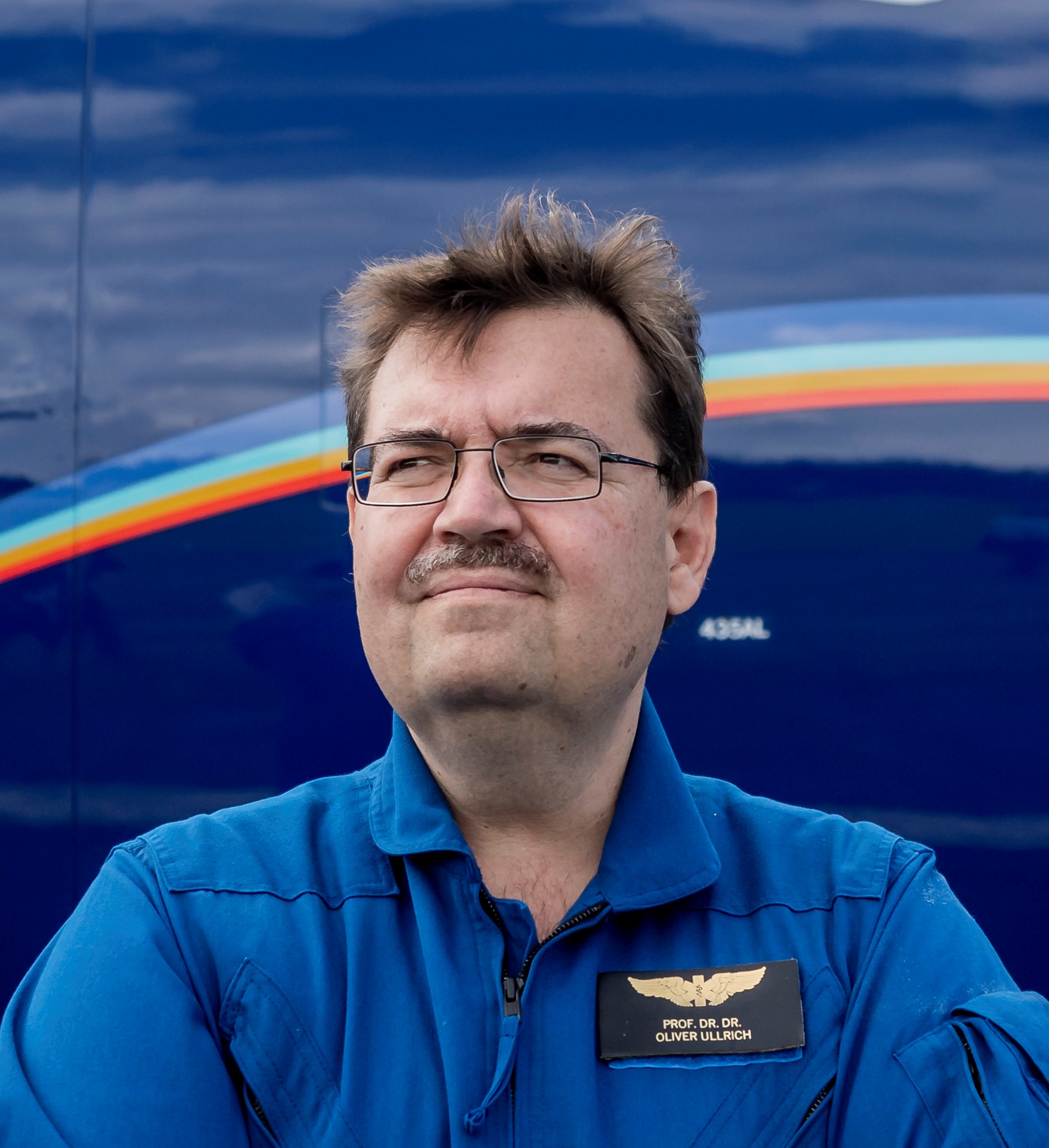
Prof. Dr. Dr. Oliver Ullrich
is Full Professor of Anatomy / Gravitational Biology and Cell Biomechanics, University of Zurich (UZH) and Director of the UZH Innovation Cluster Space and Aviation (UZH Space Hub), Professor of Space Medicine, EAH Jena and Professor of Space Biotechnology, Otto-von-Guericke-University Magdeburg, Germany, and Adjunct Professor, Beijing Institute of Technology (BIT). He is an elected Academician of the International Academy of Astronautics, President of the Swiss SkyLab Foundation, Vice President of the German Society for Aerospace Medicine, member and chair of different advisory boards for aerospace agencies and companies, and recipient of several research and teaching awards. He is experienced as scientific leader of more than 35 parabolic flight, suborbital and orbital research missions, including the International Space Station (ISS), and is working for the US (NASA-UZH Space Act Agreement) and the European (ESA) space program in the field of gravitational biology and space medicine. He is a physician and biochemist, habilitated in anatomy and cell biology and specialized in molecular immunology and aerospace medicine. He also graduated in “Teologia del Popolo di Dio” at the Pontifical Lateran University, Vatican.
Biological Challenges in Space
The gravitational force has been constant throughout the 4 billion years of Earth’s evolution and probably played a crucial role in the evolutionary development of all organisms and their cellular architecture and function, including human. During long-term space flights, many physiological systems deteriorate, contributing to an increased risk during exploration class missions. These phenomena inevitably lead to the question of whether and to what extent the human body limits the presence and reach of humans in space. Is the presence of humankind limited to Earth, from which we only observe the universe, or shall and will we leave Earth to take an active and creative role beyond our home planet ?
This is not only a question of possibilities, but also one of purpose and necessity. This question cannot be answered by natural science, space medicine or theology alone. This question can only be answered when natural science and theology refer to each other in an interdisciplinary approach. Since knowledge about the Earth, the universe, and life are possible (Wis 7,16-20), and since the cause can be recognized from the effect (Wis 13,5; Rom 1,20), all knowledge about “nature” can be considered as a part of the reality of revelation (Pope Francis, LF 34). The methods of natural sciences could therefore help to answer questions of metaphysics. In our studies, we investigated molecular functions in gravity conditions, which are not existing on Earth and discovered rapidly responding and adapting systems in human cells. It seems that the cellular architecture has an impressive endogenous capability to adapt to altered gravity environments. On the other hand, it appears that the gravitational force on Earth stabilize and maintain the genomic architecture and homeostasis of gene expression. Therefore, the architecture of human cells seems to be strongly rooted in Earth’s gravitational conditions, but on the other hand, they are highly adaptable to extra-terrestrial gravitational conditions. What can we learn from the natural sciences and space medicine regarding the role of humankind in the cosmic perspective ?
